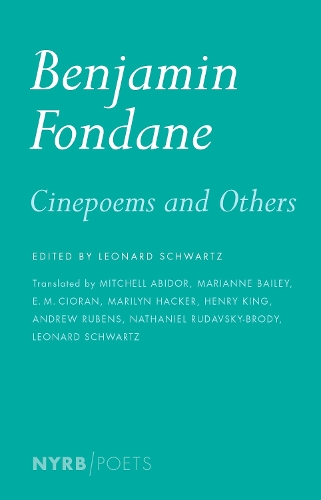
Cinepoems And Others
(Paperback, Main)
Publishing Details
Cinepoems And Others
By (Author) Benjamin Fondane
By (author) Leonard Schwartz
New York Review Books
NYRB Poets
15th June 2016
12th July 2016
Main
United States
Classifications
General
Non Fiction
841.912
Physical Properties
Paperback
232
Width 115mm, Height 180mm, Spine 12mm
192g
Description
Benjamin Fondane (1898-1945) was that rarest of poets: an experimental formalist with a powerfully lyric poetic style: a near-surrealist who embraced and produced his own version of existential philosophy: a Romanian poet who wrote in French: a self-consciously Jewish poet of diaspora and loss, whose last manuscripts made it out of Drancy, just before his deportation to Auschwitz-Birkenau in 1945, where he was gassed and murdered, yet whose poetry speaks of a plenitude, an overflowing. Writers as diverse as Jean Cocteau and the Russian philosopher Leonid Shestov praised Fondane's work during his lifetime: Man Ray photographed Fondane: Lionel Abel translated him and published his work in The Partisan Review, during The Partisan Review's heyday. After his death in the Shoah, the poetry might have been forgotten, had not writers like E M Cioran kept the memory of the work alive; now in France, Fondane's poetry is again widely available. American readers will be struck by Fondane's composition of the "Cine-poems", poems in the form of film scripts, which, in their gesture towards the silence of the image, employ words at the same moment as they despair of them, and as they participate in the surrealist discourse of the 1920's. Just as striking is the philosophical vein of thought that runs through Fondane's poems, as he interrogates the possibility of poetic knowledge. Always Fondane's lyricism - effusive, tragic, charismatic, irresistible, Eastern European - drives the writing. Finally, Fondane's secular/mystical Judaism, and his embrace of Jerusalem over Athens, grounds his poetry in the calamity - and imaginative triumph - of European Jewry. This is the first book-length translation of Fondane's poetry into English. Poems included in this collection are translated by Mitch Abidor, Marianne Bailey, E M Cioran, Joseph Donahue, Eric Freedman, Henry King, Andrew Rubens, Nathaniel Rudavsky-Brody, and Leonard Schwartz.
Reviews
Of all his contemporaries, not one, not even those who were in the Resistance, wrote in revolt, mingling the flavor of life with death, like Fondane. Henri Meschonnic
Benjamin Fondane, Romanian Jewish immigrant writing in his second language, brought a narrative vigor and a lyrical, global, tragicomic imagination to French poetry that it has rarely seen since. Marilyn Hacker
Cinepoems and Others...arrives with the force of a major literary eventthroughout the collection, there is a genuine sense of commitment and love to the work of Fondane. Its a fitting testament to the work of a complex and enduring poetic voice. Joseph Houlihan, Entropy Magazine
"Fondane ... deserves to be celebrated outside France ... as his far-ranging gifts and accomplishments are at the heart of 20th-century Jewish artistic and philosophical modernism." Benjamin Ivry, The Jewish Daily Forward
"Fondane's polemical approach confronts the reader with some explosive turns of thought which may lead us to reconsider everything we took for granted about life and art." Andrew Rubens, Glasgow Review of Books
"I am proud to have known Fondane, learnt the elements of philosophy from particularly Chestov's and his own, special kind of existential philosophy, and to have been, at a crucial moment in my youth, greatly influenced by him." David Gascoyne
"I was seized by the force of his images anchored in carnality, and I had the feeling of listening to a voice that was both unique and powerful, the voice of a man who, unworried by literary effect, shouted out his human condition." Michel Carassou
Author Bio
Benjamin Fondane (1898-1944), born Benjamin Wechsler, was a French-Romanian intellectual and surrealist poet. In 1923, Fondane fled from Romania to France, wherehe became part of a vibrant philosophical and intellectual network of Marxists, Catholics, Protestants, surrealists, and existentialists. Fondane also spent time in Buenos Aires, butreturned to France where he worked until his arrest in 1944, after which he was deported to Auschwitz, where he was killed. Leonard Schwartz is the author of several poetry collections, including IF, At Element, The Library of Seven Readings and A Message Back and Other Furors. He teaches poetics at The Evergreen State College in Washington.
